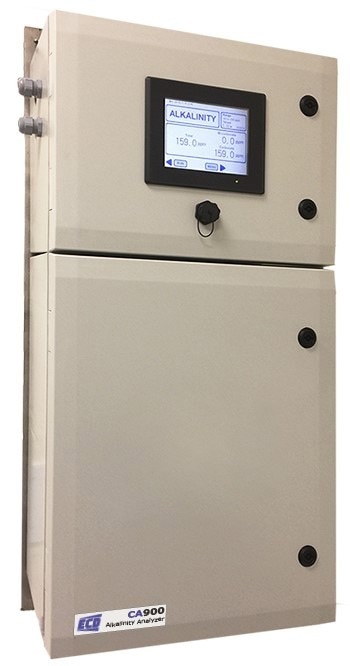
Image Credit: Electro-Chemical Devices, Inc.
One of the U.S. EPA approved methods of preventing corrosion in piping requires the understanding and balancing of the proper relationship between pH, alkalinity and DIC levels. Otherwise, toxic lead and copper contaminants can be accidentally released into the water system, which corrodes piping and contaminates the drinking water.
Alkalinity is a measure of the capacity of water to neutralize acids (pH). Alkaline compounds such as bicarbonates, carbonates and hydroxides remove hydrogen (H2) ions and lower the acidity of the water to prevent pipe corrosion. Water quality depends on maintaining the proper balance of pH and alkalinity levels, which is essential in everything from drinking water production to wastewater processes.
ECD’s sophisticated CA900 Analyzer is designed with sophisticated titration technology that is used to calculate alkalinity by dispensing known doses of a titrant fluid into a reaction cell while monitoring the pH level to its end point. The analyzer then uses the titrant concentration and amount dispensed to calculate the level of alkalinity in the sample.
Typically, the CA900 Alkalinity Analyzer performs a single measurement per analysis cycle. Its program sequence consists of a cleaning cycle, sample acquisition, monitoring of pH, adding the titrant fluid, mixing the fluid, calculation of results and data storage. The desired frequency of analysis between cycles can be easily modified to the requirements of the user’s process.
Measuring alkalinity levels with ECD’s CA900 Analyzer is especially important for the effective treatment of both municipal drinking water and wastewater, where it can affect the wastewater anaerobic digestion process. Alkalinity in surface water generally results from the presence of calcium carbonate, CaCO3, which has been leached from rocks and soil and then enters surface or ground water systems.
The intelligent CA900 Alkalinity Analyzer from ECD simplifies and automates measurement. Technicians can easily install and start up the CA900 Analyzer in less than 15 minutes with no special tools or training. It’s as easy as connecting the sample, the waste and reagent lines and then powering up the factory pre-calibrated analyzer. Wall mounting hardware is standard with each analyzer, but an optional bench top stand with reagent holder also is available.
ECD’s CA900 Alkalinity Analyzer features a choice of four different factory pre-set alkalinity calibration ranges: 0 to 50 ppm, 50 to 200 ppm, 200-1000 ppm, and 0 to>1000 ppm. Users simply order the desired calibration range, and the analyzer comes ready to go right out of the box. The analyzer’s full-featured design also comes with four 4-20 analog outputs, an Ethernet digital output and four user-configurable alarm relays.
Accessing information or customizing analysis routines are both easily accomplished with the CA900 Titration Analyzer’s user-friendly menu structure and touchscreen interface. The analyzer also can be web-enabled as a powerful internet of things (IoT) tool for remote monitoring and interfacing with personal handheld devices such as controllers, mobile phones, tablets, laptops and computers.